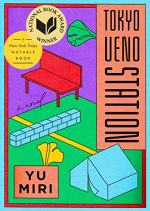|
This section contains 773 words (approx. 2 pages at 400 words per page) |

|
Tokyo Ueno Station Summary & Study Guide Description
Tokyo Ueno Station Summary & Study Guide includes comprehensive information and analysis to help you understand the book. This study guide contains the following sections:
This detailed literature summary also contains Quotes and a Free Quiz on Tokyo Ueno Station by Yu Miri.
The following version of this book was used to create this study guide: Miri, Yu. Tokyo Ueno Station. New York: Riverhead Books, 2020.
The novel begins in Tokyo's Ueno Park where first-person narrator Kazu Mori is living as a ghost. Prior to his death, he was a member of the park's homeless community. Kazu watches people come and go from the park as he reflects on the most significant regrets of his life.
Kazu grew up during World War II in a town called Sōma in Japan's Fukushima Prefecture. He was one of eight children and had to begin working right after middle school to help the family with their finances. He went on to work almost ceaselessly his entire life and rarely spent time with his wife, Setsuko, and their two children, Yoko and Kōichi. Kazu has only one significant memory of spending time with the children while they were young. He took them to a festival in a nearby town, but the day was unsatisfying because Kōichi wanted to take a helicopter ride like the other children and Kazu could not afford this. In 1963, Kazu traveled to Tokyo to work on preparation for the 1964 Olympic Games, digging foundations and constructing athletic facilities. Both of his children were under five when he left Sōma, and from that point on he only went home for holidays.
Back in the park, Kazu hears a homeless man and woman discussing the recent death of another homeless man named Shige. While he was alive, Shige was an acquaintance of Kazu's. Kazu remembers him as an “intellectual” (27) who kept a pet cat in his tent and enjoyed regaling Kazu with stories about the park's history.
Kazu recalls the birth of his son Kōichi, which happened to occur on the same day in 1960 that Emperor Akihito's wife gave birth to a son. Setsuko had a difficult delivery and Kazu had to find the town's midwife to assist, all the while worrying that they could not afford to pay her. Kōichi died at age 21 while Kazu was away working in Tokyo. Kazu returned to Sōma for the funeral and cremation services, and experienced overwhelming feelings of grief and regret about spending such little time with his son during his short life. Kazu remembers the priest overseeing the ceremonies explaining the Pure Land Buddhists' belief that the deceased transitioned to an afterlife in which they would become a bodhisattva and serve as a link between their living loved ones and the Buddha.
One day, Shige invited Kazu into his tent to drink sake. Shige revealed that he had left his home and family because of something he had done that brought him great regret and shame. Kazu sensed that Shige would have liked him to ask for more details and perhaps to share his own personal history, but Kazu did not engage in either of these conversational paths. He did not wish to establish a close bond with anyone.
Kazu follows two older women into the Ueno Royal Art Museum and listens to their conversations about their families. He remembers a time when he was working in Tokyo and occasionally visited a cabaret, where he met a hostess named Junko. He danced with her, but never took her out or otherwise engaged in infidelity. Just before returning to Sōma permanently after he retired, Kazu brought Junko a bouquet of white roses.
After he retired, Kazu only had seven years with Setsuko before she passed away. Much like after Kōichi's death, he attended the funeral ceremonies in a fog of grief and regret about how little time he had spent with his wife. Afterward, Yoko sent her eldest daughter, Mari, to stay with Kazu. However, he worried about being a burden to her, so he decided to return to Tokyo. He arrived at Ueno Station and began living among the homeless in the adjacent park.
Several years passed. One day, a sign was erected in the park stating that the homeless residents were required to move their belongings and dwellings off the premises for the day. Shige told Kazu that this was happening because Emperor Akihito was going to be driving past the park. Kazu collected his things and wandered around the park's perimeter. He stopped on a bridge and watched the emperor pass, then he went inside Ueno Station. He stood on the platform and had a vision about a tsunami hitting Fukushima. He saw Mari swept away by a giant wave and floating out to sea. He stepped from the platform in front of an oncoming train.
Read more from the Study Guide
|
This section contains 773 words (approx. 2 pages at 400 words per page) |

|



